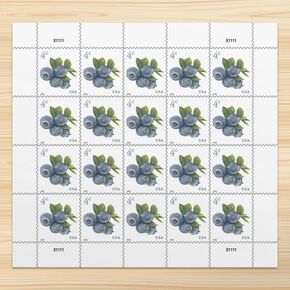- Shopping, made easy.
- /
- Get the app!
Celebrate the beauty and ingenuity of some of America's most successful freshwater fishing lures with this colorful pane of 20 Forever stamps featuring five different, close-up photographs of five popular lures. The collection is a sampling of modern fishing lures used in different environments:
Crankbaits, or plugs, are popular among anglers because they are relatively easy to use. They attract a variety of fish including bass, walleye, and pike. Their unique swimming action is generated by a plastic lip and curved body, which makes them dive and wiggle just by reeling them in. Anglers tend to run these lures along the bottom, bouncing them off rocks, logs, or other submerged structures.
An in-line spinner lure is made to mimic the movement of a swimming baitfish, attracting predator fish with a spinning blade and a weighted body that create vibration in the water. They often have tails dressed with feathers, animal hair, or rubber skirting to attract bass, trout, pike, and other species in shallow streams, rivers, and lakes.
Spoon lures have been around since the 1800s and are named for their concave shape. Spoons have remained popular because their unique movement and glimmer under water are so effective at catching fish, especially bass, pike, and trout.
Topwater lures are extremely popular and are designed to be fished on the surface of the water: Wakebaits use wings to create a commotion like the wake of a boat as they skim the surface. A popper has a concave face that creates a popping sound when it is pulled across the water.
Given the many choices open to anglers, there is truly a fishing lure for any occasion. Whether in lakes, streams, or rivers, a fisherman or fisherwoman can catch just about any target if they have the right tools.
Every freshwater fishing lure has a unique history, and each has played a significant role in the evolution of fishing as a sport. From the earliest handmade wooden lures to swimbaits made of modern materials, there are countless freshwater lures available, each designed to meet the specific needs of the angler.
 United States Postal Service Celebrating Lunar New Year: 2025 Year of The Snake, Sheet of 20 Postage Stamps
KWD 9.500
United States Postal Service Celebrating Lunar New Year: 2025 Year of The Snake, Sheet of 20 Postage Stamps
KWD 9.500
 Strawberries 2017 3-Cent (Roll of 100) Denominated Mail-use Additional Postage Stamps
KWD 6.500
Strawberries 2017 3-Cent (Roll of 100) Denominated Mail-use Additional Postage Stamps
KWD 6.500
 Blueberries 2022 4-Cent (Sheet of 20) Four-Cent Denominated Mail-use Additional Postage Stamps
KWD 2.500
Blueberries 2022 4-Cent (Sheet of 20) Four-Cent Denominated Mail-use Additional Postage Stamps
KWD 2.500
 Constance Baker Motley 2024, Black Heritage (Sheet of 20) First-Class Mail Forever Postage Stamps
KWD 9.500
Constance Baker Motley 2024, Black Heritage (Sheet of 20) First-Class Mail Forever Postage Stamps
KWD 9.500